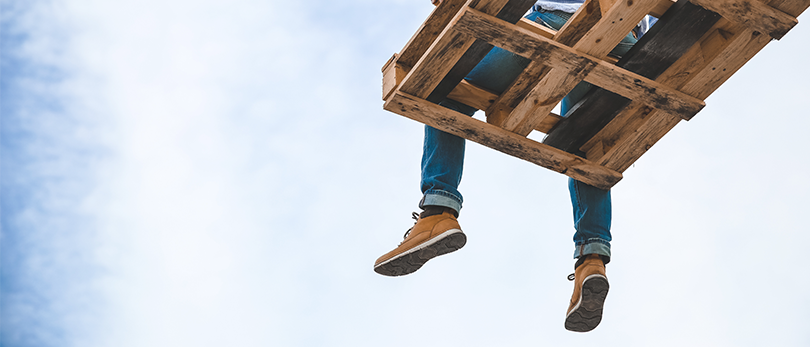How does acrophobia, a fear of heights, develop?
It is not so easy to study the development of a phobia because it is constructed according to the history of each individual. To understand acrophobia, the fear of heights, it is interesting to look for the source of this development. Most often, we find three factors at the origin of the triggering of this phobia. It can be a trauma, an inner ear defect or an anxious temperament.

Why are we afraid of heights or heights?
The trauma that causes acrophobia
Panic fear can be triggered by a heavy fall or a very unpleasant situation. If you have been particularly affected by a fall, you will do everything to prevent it from happening again. The initial fear of a specific situation is gradually extended to new circumstances and is combined with a fear of heights.
Imagine being stuck in a cable car on a windy day
The cab starts to move considerably and you see the cables bend under the weight of the whole thing. You feel increasingly unwell and hear the others laughing at your agitated behaviour. It is only when the cable car starts again and arrives at the station that you feel better. You have been through hell in those few minutes and you emerge from the experience traumatized. The inability to control your emotions has left you feeling so ashamed that you are not about to repeat the experience any time soon. In fact, you wonder whether you will ever be able to do it again. This is therefore a fear, an anxiety. The origin of the disorder is then of a psychic nature.
The vestibular apparatus, cause of the fear of heights
Acrophobia can also be caused by a defect in the inner ear, more specifically the vestibular system. This system plays an important role in the balance of the body. When it is affected, it is often not serious, but it causes a violent discomfort. The information sent to the body, the muscles, the eye and the brain is contradictory. They are no longer evaluated properly and cause you to lose your balance. If these dizzinesses are triggered when you are at a height, the combination of these symptoms with the anxiety-provoking situation may be the cause of the development of acrophobia.
Fear of heights: a fear that develops more in people with an anxious nature
Finally, fear of heights is more likely to develop if you have an anxious nature. This temperament is built up from birth, when the child develops relationships with parents and relatives. If they are afraid of heights, they will naturally transmit a pattern of negative and anxious reactions. When the child grows up, his representations will be the same as those he has been taught and he will reproduce them when he is confronted with situations of height. “How can I not be afraid of heights if my own parents are unable to cope with them? Every time I find myself in a high situation, they tell me not to go or to take all the necessary precautions before going up, to be careful, so much so that I no longer manage to take the smallest paths with significant differences in level…”.
Once they become adults, children develop the same phobia as their parents. This shows how much the child’s upbringing contributes to the development of a person’s pathology. Thus, the treatment of acrophobia is largely based on a mode of behavioural strategies specific to each individual.
The fear of heights in everyday life
Avoidance and mental load
One of the advantages of acrophobia, compared to agoraphobia for example, is that situations at heights often seem at first sight to be quite easy to avoid. But repeatedly engaging in this type of behaviour ultimately causes more problems than it does a real lasting solution. First of all, you may not be able to participate in a number of physical, cultural and even social activities. You will not be able to go for a drink on a rooftop with your friends, go for a walk or visit certain monuments. In the medium and long term, this can have a real negative impact on your quality of life. On the one hand, you may have enjoyed this type of activity before your phobia was triggered. Giving it up systematically will therefore provoke negative emotions that may affect your mood more or less permanently. On the other hand, as your family and friends do not share your fear, it is very likely that they will continue to engage in these activities without you on a more or less regular basis, which will quickly make you feel excluded.
The perverse effect of avoidance is that it insidiously reinforces the idea that being at height is an extremely important threat to your life. It’s a vicious circle: the more you avoid such situations, the more vital it will seem to you to avoid them until you can no longer physically be in even slightly elevated places. At that point, you will have to organise most of your life so that you don’t have to deal with these situations. In other words, you will develop a non-negligible mental burden which you will have to deal with on a daily basis and which will gradually impact the various spheres of your life.
Health consequences
The inability to take part in activities with your friends or family, the mental burden that transforms your daily life and forces you to make constant adaptations can lead to phases of depression or even breakdown. If your fear also affects your professional activity, it can lead to a certain extent to burnout, or even potentially to ergophobia.
Acrophobia can sometimes be combined with or even lead to other phobias. Typically, people with acrophobia are often afraid to drive on high roads. If you regularly drive in the mountains or have to drive over a bridge to get home, for example, it is very likely that you will also develop a form of amaxophobia.

